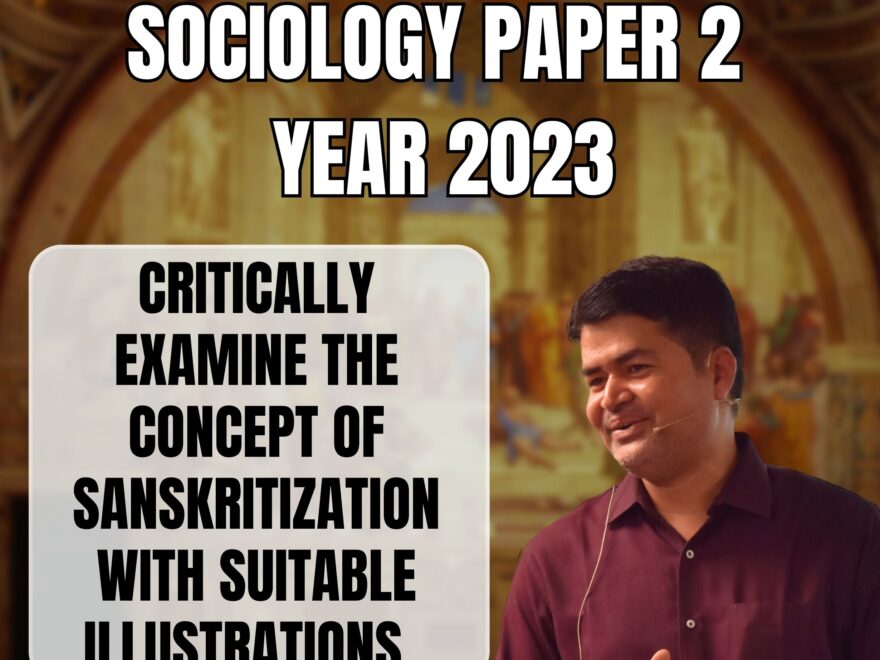Critically examine the concept of Sanskritization with suitable illustrations.
Section: A.
Sociology Paper 2023 Analysis.
Relevant for Paper 2: Unit-12 Social structure; Caste system
Question 3 (c): Critically examine the concept of Sanskritization with suitable illustrations
(10 Marks)
|
Introduction: Define Sanskritization Main Body: Explanation of Sanskritization with Illustrations and then Explain the Limitations of the Concept Conclusion: significance of the concept |
Introduction:
-
Sanskritization is a term coined by M.N. Srinivas in his work Religion and Society among the Coorgs of South India. He described Sanskritization as “a process by which ‘low’ caste or tribe or the other group takes over the custom, ritual , beliefs, ideology and style of life a high and, in particular, a ‘twice born’ caste. It is followed by a claim to a higher position in the caste hierarchy than traditionally concealed to the claimant caste by the local community. Such claims are made over a period of time, sometimes a generation or two before they are conceded.”
Main body:
- It is an endogenous source of social change. This term used by M N Srinivas to describe the process of cultural and social mobility in the traditional social structure of Indian society.
- The impact of Sanskritisation is manifold. Its influence can be seen in language, literature, ideology, music, dance, drama, style of life and ritual. The process gained momentum after the arrival of the British, as means of communication hastened the process and its impact was felt in even the remotest corners of villages.
- Sanskritisation suggests a process whereby people want to improve their status through adoption of names and customs of culturally high-placed groups. The reference model is usually financially better off as well.
- In many instances highly Sanskritised caste was dominant, the culture of the entire region underwent a certain degree of Sanskritisation.
Some suitable illustrations of Sanskritization:
- Vegetarianism: One clear example of Sanskritization is the adoption of vegetarianism by people belonging to the so-called “low castes” who are traditionally not averse to non-vegetarian food. This is done in emulation of the practice of twice-born castes.
- Arya Samaj: The Hindu Jat in rural North India did Sanskritization with the help of Arya Samaj as a part of a social upliftment effort.
- Education: Education is another way in which lower castes can attempt to raise their social status through Sanskritization. By acquiring education, they can gain knowledge of the customs and rituals of the upper castes and emulate them.
- Occupation: Another way in which lower castes can attempt to raise their social status is by taking up occupations traditionally associated with the upper castes. For example, a lower caste person may become a priest or a teacher.
Criticism of Sanskritization
- N. Majumdar argues that in regions where the non-Sanskritic castes were dominant, it was their influence that was stronger. This can be termed the process of de-Sanskritiation. There were other regional variations too. In Punjab, Jammu and Kashmir culturally Sanskritic influence was never very strong.
- Other critics argue that Srinivas overemphasised on mobility. Mobility in caste structure is very difficult , hardly any change in status is observed
- With Sanskritisation, evils of higher caste people such as a patriarchal dominance, dowry system, conspicuous consumption also permeated to lower castes.
- Harold Gould believes that lower caste people imitate the way of life of higher caste not because of cultural aspect but socio-political and economic dominance that higher caste possesses.
Conclusion:
Sanskritization as a process of social change in contemporary Indian society has lost much of its relevance due to reservation policy, rise of Dalit consciousness, Westernization replacing Sanskritization, democratic polity among other factors. Despite such changes and much criticism, the concept still stands tall for providing an unconventional perspective of Indian society in general and caste system in particular. It was born out of detailed field works which changed the very face of the approaches to study the Indian society.
Related Blogs…
To master these intricacies and fare well in the Sociology Optional Syllabus, aspiring sociologists might benefit from guidance by the Best Sociology Optional Teacher and participation in the Best Sociology Optional Coaching. These avenues provide comprehensive assistance, ensuring a solid understanding of sociology’s diverse methodologies and techniques.
META TAGS: A Contextualize Louis Dumonts concept of binary opposition, A Contextualize Louis Dumonts concept of binary opposition, A Contextualize Louis Dumonts concept of binary opposition, A Contextualize Louis Dumonts concept of binary opposition, A Contextualize Louis Dumonts concept of binary opposition, A Contextualize Louis Dumonts concept of binary opposition, A Contextualize Louis Dumonts concept of binary opposition, A Contextualize Louis Dumonts concept of binary opposition
Why Vikash Ranjan’s Classes for Sociology?
Proper guidance and assistance are required to learn the skill of interlinking current happenings with the conventional topics. VIKASH RANJAN SIR at TRIUMPH IAS guides students according to the Recent Trends of UPSC, making him the Best Sociology Teacher for Sociology Optional UPSC.
At Triumph IAS, the Best Sociology Optional Coaching platform, we not only provide the best study material and applied classes for Sociology for IAS but also conduct regular assignments and class tests to assess candidates’ writing skills and understanding of the subject.
Choose The Best Sociology Optional Teacher for IAS Preparation?
At the beginning of the journey for Civil Services Examination preparation, many students face a pivotal decision – selecting their optional subject. Questions such as “which optional subject is the best?” and “which optional subject is the most scoring?” frequently come to mind. Choosing the right optional subject, like choosing the best sociology optional teacher, is a subjective yet vital step that requires a thoughtful decision based on facts. A misstep in this crucial decision can indeed prove disastrous.
Ever since the exam pattern was revamped in 2013, the UPSC has eliminated the need for a second optional subject. Now, candidates have to choose only one optional subject for the UPSC Mains, which has two papers of 250 marks each. One of the compelling choices for many has been the sociology optional. However, it’s strongly advised to decide on your optional subject for mains well ahead of time to get sufficient time to complete the syllabus. After all, most students score similarly in General Studies Papers; it’s the score in the optional subject & essay that contributes significantly to the final selection.
“A sound strategy does not rely solely on the popular
Opinion of toppers or famous YouTubers cum teachers.”
It requires understanding one’s ability, interest, and the relevance of the subject, not just for the exam but also for life in general. Hence, when selecting the best sociology teacher, one must consider the usefulness of sociology optional coaching in General Studies, Essay, and Personality Test.
The choice of the optional subject should be based on objective criteria, such as the nature, scope, and size of the syllabus, uniformity and stability in the question pattern, relevance of the syllabic content in daily life in society, and the availability of study material and guidance. For example, choosing the best sociology optional coaching can ensure access to top-quality study materials and experienced teachers. Always remember, the approach of the UPSC optional subject differs from your academic studies of subjects. Therefore, before settling for sociology optional, you need to analyze the syllabus, previous years’ pattern, subject requirements (be it ideal, visionary, numerical, conceptual theoretical), and your comfort level with the subject.
This decision marks a critical point in your UPSC – CSE journey, potentially determining your success in a career in IAS/Civil Services. Therefore, it’s crucial to choose wisely, whether it’s the optional subject or the best sociology optional teacher. Always base your decision on accurate facts, and never let your emotional biases guide your choices. After all, the search for the best sociology optional coaching is about finding the perfect fit for your unique academic needs and aspirations.
Follow us :
🔎 https://www.instagram.com/triumphias
🔎 https://www.youtube.com/c/TriumphIAS
🔎 https://t.me/VikashRanjanSociology
Find More Blogs…
| Compare and contrast Karl Marx’s and Max weber’s | Karl Marx- Historical Materialism |
| Position of Women In the Modern Indian Society | Sociology: Social system and pattern variables |
Keywords: concept of Sanskritization with suitable illustrations, concept of Sanskritization with suitable illustrations, concept of Sanskritization with suitable illustrations, concept of Sanskritization with suitable illustrations concept of Sanskritization with suitable illustrations, concept of Sanskritization with suitable illustrations concept of Sanskritization with suitable illustrations concept of Sanskritization with suitable illustrations concept of Sanskritization with suitable illustrations concept of Sanskritization with suitable illustrations concept of Sanskritization with suitable illustrations,concept of Sanskritization with suitable illustrations



One comment